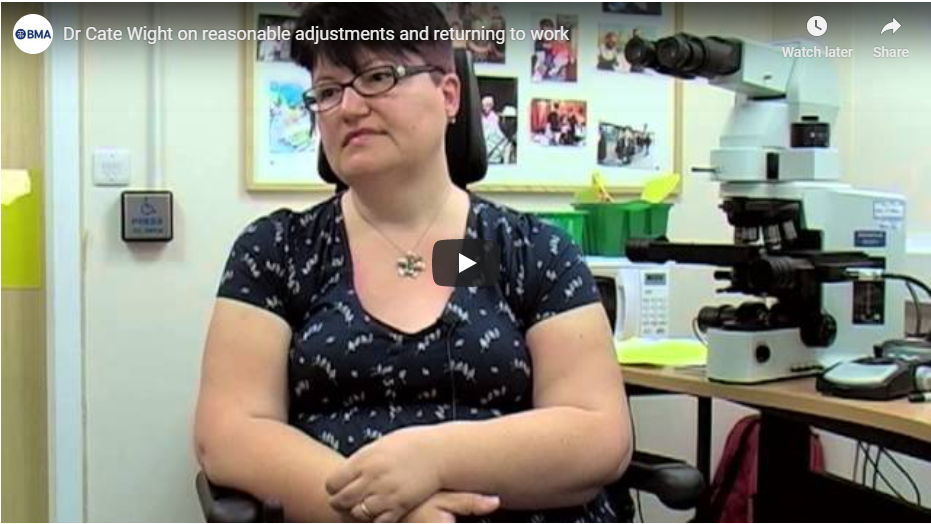Find out more about how to ask for reasonable adjustments to help you carry out your study, training or work.
What are reasonable adjustments for?
Having a disability or long-term health condition is not an automatic barrier to studying or practising medicine. Many medical students with long-term health conditions and disabilities successfully complete their degrees and go on to practise medicine.
And many doctors who develop a long-term health conditions or disability during their careers continue to work in medicine for many years. It is vital to have support in place for these individuals throughout their careers.
Your medical school, Deanery or workplace should support your study, training and working life. Making reasonable adjustments means making changes to the way things are done to remove barriers individuals face because of disability or a long-term health condition.
Reasonable adjustments are specific to each individual and can change over time, especially if you have a health condition that fluctuates. Reasonable adjustments can be made to support both physical and mental health conditions and for learning difficulties.
Adjustments can include changes to processes, to physical spaces, and the provision of specialist equipment. It can also include changes to working patterns.
Who to ask about reasonable adjustments
For students, your medical school should have a disability support adviser to discuss with you the adjustments required to facilitate your learning. If reasonable, the adjustment is implemented and reviewed throughout your studies.
Prior to postgraduate training, contact your postgraduate dean or medical royal college to assess what you will need during your foundation year and beyond.
Securing reasonable adjustments should ideally be discussed prior to attending university or commencing your postgraduate training. This makes it more likely that the right support will be in place when you start.
Adjustments should also be reviewed regularly with your education supervisor, line manager and occupational health as needed, to ensure that they are providing the support you need.
If you are diagnosed with a long-term condition or disability while you are training or working you should also discuss this as soon as possible so that adjustments can be made to help you continue to work or study.
What the law says about reasonable adjustments
The Equality Act 2010, which applies to England, Scotland and Wales, describes the 'duty to make adjustments'. In Northern Ireland the relevant legislation is the Disability Discrimination Act 1995 and Special Educational Needs and Disability (Northern Ireland) Order 2005.
The duty to make reasonable adjustments for medical education organisations and employers is that they must take positive steps to remove barriers that place individuals at a substantial disadvantage because of their disability.
Organisations always have to consider requests for adjustments, but they only have to make the adjustments which are reasonable. The Act provides that a disabled person should never be asked to pay for the adjustments.
What is 'reasonable'?
There is no set definition of what ‘reasonable’ means. What is ‘reasonable’ can only be decided on a case-by-case basis and will always depend on the individual person and their circumstances.
The Equality and Human Rights Commission advises that whether an adjustment is reasonable depends upon all the circumstances including:
- whether the adjustment will actually overcome the identified difficulty
- how practicable it is to make the adjustment
- the financial and other costs involved
- the amount of disruption caused
- the money already spent on adjustments
- the availability of financial or other assistance.
Many reasonable adjustments can be inexpensive and, in some cases, Disabled Students' Allowances can be granted to cover the partial or full cost of any adjustment.
Disabled Students' Allowances are grants to help UK students meet the extra costs of studying that they face as a direct result of a disability or learning difficulty.
Find out more about Disabled Students' Allowances
Support at different stages of your medical career
The BMA has worked with the GMC to produce Welcomed and Valued, a guidance document for supporting medical students and doctors in training with disability or long-term health conditions. This contains a range of useful information on the support you are entitled to and can expect to receive.
Find out more about reasonable adjustments at each stage of your medical career
Watch our case study video
Dr Cate Wight talks in detail about her about her own experiences of making reasonable adjustments at her workplace and how she dealt with a phased return to work.


